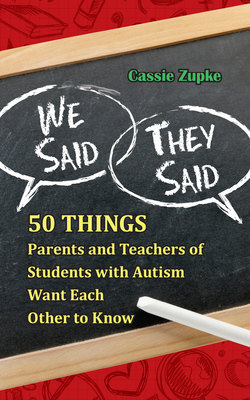Читать книгу We Said, They Said - Cassie Zupke - Страница 14
На сайте Литреса книга снята с продажи.
Оглавление
When your child has autism, taking him on a trip to the grocery store is like running the gauntlet. If you're physically able to pick up your child, you put him in the shopping cart, even if he's too big. Failing that, you keep your eyes and perhaps a hand on him at all times. Otherwise he may run—into the parking lot or the wine section or the aisle of cleaning products. As you make your way through the store, you stay in the middle of the aisle to reduce his ability to grab things from the shelf. You make sure he has his comfort objects with him or something on hand to distract him. You do everything you can think of to increase the odds of making it through the store with as little trouble as possible.
You can't control everything, though. He can still see things he really, really, really has to have right now, or his world will fall apart in a big way. Buzzing fans, flickering lights, or cold refrigerated sections may overwhelm him and send him into a tantrum. Watching another shopper taste-test the grapes may trigger loud, indignant demands for punishment of the thief. Or, your child may decide to do something really unusual that makes sense to him and no one else, like licking the person in front of you in the checkout line.
Your child has perfectly good reasons for his behaviors. Unfortunately, they are not obvious to the people around you. Folks with autism don't have a giant “A” tattooed on their foreheads. They look like everyone else. When you're out in public and your child acts in a socially inappropriate manner, you're lucky if bystanders just think your child is strange. Typically, however, they assume he's an obnoxious brat whose idiot parents don't discipline him properly. Unless the child is 16 years old and 6 feet tall, in which case they may think he is dangerous.
You can almost always tell what the people around you are thinking, because they give you looks of puzzlement and disapproval. They gather their children and walk away from you with expressions of shock and pity. Sometimes they stop to offer you some advice, too.
“If you'd just discipline him more, he wouldn't do those things.”
“You're not really going to buy him that after the way he acted, are you?”
“Can't you keep your child under control?”
“What's wrong with your child?”
“Why is he doing that?”
“A good swat on the rear would take care of that.”
“Is he retarded?”
“Your child is bad.”
“If you were more firm at home, you wouldn't have this problem.”
“We like you very much, but we'd rather you didn't bring your child.”
And that's just from the adults. The things kids say are worse.
Now multiply these reactions by however many years your child has been mobile and all the places you've visited together—not just the grocery store but every public place you've ever taken your child. The park. The library. The movies. Doctors' offices. Your parents' house. Sunday school and church. Other kids' birthday parties. Family reunions. His classroom. Are you beginning to get the picture? Imagine watching your child run over to play with other children on the playground, only to have the group disband as he nears. Then the kids regroup somewhere else, and when he tries to join them, they run away again. Picture your teenager sitting alone in the school lunchroom while kids talk under their breath as they pass by him. “Freak.” “Weirdo.” Imagine your grown child never having a friend or a romantic relationship because he's unable to grasp the nuances of social interaction.
Years of rejection can make someone a little touchy and a tad defensive. It's human nature. If you watch your child get rejected enough times, you lose your trust in people. It's easier to withdraw than to take a chance again. You start to see disapproval in people's eyes even if it isn't there, because you know it's just a matter of time until it appears.
So, yes, I might be oversensitive when it comes to my child, and he might be touchy, too. We may both be defensive and quick to react at times. We may retreat behind walls of silence, blame, or denial. It's a double-edged self-defense mechanism that's enabled us to face each new day, even if it has caused our feelings of exclusion to grow.
The choices you make now when you interact with my child mean more to us than you know. Your opinion and your reactions are amplified in our eyes. Will your interactions with him be another drop in the tide of rejection we've lived with his whole life? Or, instead, will they be a lifeboat—a small space of acceptance and stability, where he feels safe and he can learn to make his way toward the shore of social acceptance? It may take a while for us to trust you and even longer for us to trust society as a whole. But you can't imagine how much we'd like to try.
